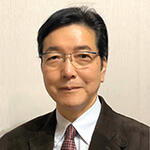
Yuichi Ikuhara Professor
| +81-3-5841-7688 | |
| +81-3-5841-7694 | |
| ikuhara[at]sigma.t.u-tokyo.ac.jp
* In your correspondence, please replace [at] with "@" in the above email address. |
|
| http://interface.t.u-tokyo.ac.jp/english/index.html | |
| ceramics, advanced transmission electron microscopy, grain boundary, interface, dislocation, high-temperature plastic defamation |
Research
Mechanical and electronic properties in materials are strongly influenced by the atomic and electronic structures of the grain boundaries and hetero interfaces. The main research in the Crystal Interface Laboratory is related to the grain boundary and interface characterization and their phenomena. We are developing the researches as the following:
a) Advanced transmission electron microscopy for materials science (STEM, HRTEM, EDS, EELS)
b) Grain boundary and interface characterization, properties and phenomena in ceramics
c) High temperature deformation behavior in single crystal and polycrystalline ceramics
d) Lattice defects (Dislocation Technology)
e) Theoretical calculation for materials science (First principles, MD, MO)
f) Oxide ionic conductor , Quantum device, Nano Wire
主要研究論文
D. Yin, C. Chen, M. Saito, K. Inoue and Y.Ikuhara, “Ceramic phases with
a one-dimensional long-range order”, Nature Mater., https://doi.org /10.1038
/s41563-018-0240-0 (2019)
S. Kobayashi, A. Kuwabara, C. A. J. Fisher, Y. Ukyo, and Y. Ikuhara,
"Microscopic mechanism of biphasic interfacerelaxation in lithium
iron phosphate after delithiation," Nature Comm., 9, 2683 (2018).
E. Tochigi, Y. Kezuka, A. Nakamura, A. Nakamura, N. Shibata, and Y. Ikuhara: “Direct observation of impurity segregation at dislocation cores in an ionic crystal”, Nano Letters 17 (2017) 2908–2912.
S. Kondo, T. Mitsuma, N. Shibata and Y. Ikuhara: “Direct observation of individual dislocation interaction processes with grain boundaries”, Science Advances 2 (2016) e1501926.
I. Sugiyama, N. Shibata, Z. Wang, S. Kobayashi, T. Yamamoto, and Y.Ikuhara: “Ferromagnetic dislocations in antiferromagnetic NiO”, Nature Nanotech. 8, 266 (2013).